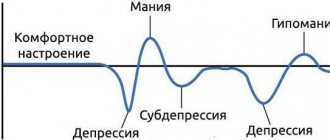Features of adolescence
From a psychological point of view, the age of transition from childhood to adulthood begins and ends individually. The child begins to strive for independence, wants to find his place in society, and sometimes even change his immediate environment. He begins to develop political sympathies - often they are opposite to his parents'. The views reveal categoricalness and intolerance—youthful maximalism. Behavior often becomes uncontrollable and aggressive.
During the transition period, romantic relationships arise. The child searches for his sexual identity and begins to be sexually active. He may try smoking, use alcohol or drugs, strives to make his own decisions and rejects everything that seems uncomfortable to him.
Features of behavior
Very often, in the process of communication, character defects of chemically dependent people can be traced. These qualities can greatly aggravate the course of the disease and lead to serious consequences.
It is necessary to pay close attention to those who are at risk. These people can be recognized by their behavior:
- they turn a blind eye to obvious problems, pretending that they do not exist;
- do not openly express their thoughts and feelings;
- resort to manipulation to satisfy their needs;
- express their thoughts in allegory to avoid direct statements;
- make unrealistic plans and blame other people for their failure;
- they find enemies everywhere and suspect ill-wishers;
- They don’t remind you of their problems, pretending that they no longer exist.
Chemical dependence is one of the most severe, so it is difficult to identify in the early stages. People try to hide their vulnerability through defensive techniques such as denial, avoidance, isolation from reality, assertion of self-worth and self-sufficiency, and aggression or bravado. Denial is considered the most dangerous, since in this case a person is not aware of the presence of a problem.
Antisocial behavior
Antisocial behavior is a persistent deviation from generally accepted norms. Forms of antisocial behavior in adolescents include emotional, behavioral and psychotic disorders, eating disorders, self-harm and suicide, substance use and risky sexual behavior. Vagrancy, gambling, foul language, lies, and hysterical attacks are possible. Source: T.T. Byazrova Social norm and social deviations in the behavior of minors // Current issues of modern science, 2010
Types of antisocial behavior
- Disapproved - occasional mischief and pranks.
- Condemned – causes systematic condemnation from adults.
- Deviant – immoral and immoral actions.
- Addictive – actions committed under the influence of alcohol and drugs.
- Delinquent – pre-criminal, administrative-delicate.
- Criminal – illegal, violation of legal requirements.
Antisocial individual (person): who is he, signs – Suppressed
26.11.2019
An antisocial person is a personality type who is indifferent to the norms and rules of behavior in society. He does not experience the usual human emotions - pity, sympathy, shame. The reason for asociality may lie in medical, pedagogical and social factors.
An antisocial person doesn’t care about the rules of society; he has his own
An antisocial person, what does this mean?
An antisocial personality is a person whose actions do not fit into the standards of behavior of modern society. He may violate legal, moral and ethical standards intentionally or out of ignorance, not understanding why his behavior is unacceptable. Another name for an antisocial personality is a sociopath.
Antisocial people are indifferent to established rules and public morality; they do not feel shame or sympathy for others. A complete lack of interest in other people and perverted concepts of moral values prevent them from fully integrating into society.
Important! Without treatment and help, deviant behavior becomes a way of life, leading to criminal acts, infection with HIV and STDs, and death
Causes of appearance in children
Biological. The prefrontal cortex, responsible for cognitive control, is just beginning to develop. Therefore, when making decisions, the brain uses the limbic system, which is responsible for the sphere of emotions. The actions of a teenager seem illogical to adults. In reality, a small person is simply not yet able to control emotional swings and the need for strong sensations. Source: A.I. Papkin Deviant behavior and psychological ways of its prevention // Bulletin of RUDN University, Ser. "Psychology and Pedagogy", 2007, No. 2, pp. 6-13
Social – the influence of the media and gender norms, the psychological climate in the family and the role among peers. Harsh parenting practices, sexual abuse, discrimination and social exclusion, bullying and socioeconomic problems increase the risk of antisocial behavior. Risk groups include orphans, members of minorities, teenagers who became parents early or entered into marriage, including forced marriage.
Pedagogical – educational strategy of parents and teachers (for example, hypo-custody or hyper-custody).
Psychological – attention deficit hyperreactivity disorder, neurological and somatoform disorders, autism spectrum disorders, mental retardation.
How do people become sociopaths?
A sociopathic personality develops under the influence of negative sociocultural conditions. Domestic violence, lack of love, attention and education, childhood psychological trauma - all these are triggers that contribute to the development of a sociopathic disorder. The psychology of a sociopath is shaped by the environment, exacerbating natural deficiencies.
How does a sociopath behave?
► A sociopath is a genius at disguise. 80% of the time he behaves exactly the same as most people around him. What distinguishes him from other people is only his pathological deceit, selfishness, and ability to perform extraordinary actions. Most often, the understanding that something is wrong with this person comes only through close and prolonged communication.
Can a sociopath love?
► Love is too deep a feeling, which implies the formation of attachment. However, we should not forget that physiologically sociopaths are the same people, which means they also produce neurotransmitters - serotonin, dopamine, etc. Accordingly, the question of whether a sociopath can fall in love should be answered positively. However, his feelings are more about the desire to satisfy sexual needs and the desire to achieve the favor of his chosen partner.
Does a sociopath have feelings?
► The main feeling of a sociopath is self-love. Therefore, he is easily hurt by disrespect and criticism. A sociopath may become attached to those who benefit him. So, if normal people grieve over the death of loved ones, a sociopath painfully experiences the loss of the comfort that the deceased person provided him.
Is a sociopath dangerous?
► The level of danger of a sociopath depends on many factors: his upbringing, the presence of control from society, the presence of concomitant mental disorders. For the most part, sociopaths pose a threat to their immediate environment, since the danger of punishment prevents them from openly breaking the law.
Causes of sociopathy
A number of other studies have also shown that sociopaths most often become people with certain genetic disorders, who did not receive the right upbringing or were victims of violence. It follows from this that even in the presence of certain genetic abnormalities or underdevelopment of the prefrontal cortex, environment and upbringing play a decisive role.
How to get rid of sociopathy?
There are certain psychotherapy techniques that help sociopaths integrate into society and understand the motivations of normal people. However, there is no complete treatment for dissocial personality disorder. Moreover, most sociopaths do not consider themselves unhealthy, and therefore do not try to be treated.
Recommended reading
To study this interesting topic in more depth, it is worth reading the following books about sociopathy:
- M. Thomas, “Confessions of a Sociopath. Live without looking into your eyes”;
- S. Petri “Toxic people: Self-defense without weapons”;
- J. Douglas, M. Olshaker “Descent into Darkness”;
- M. Stout “The Sociopath Next Door”;
- M. Thomas “Confessions of a Sociopath”;
- D. McKenzie, Psychopath Free;
- R. Haer “Deprived of Conscience”;
- K. Tilman, “Sociopaths.”
What does an antisocial person mean?
In order to understand who an antisocial person is and not to confuse this concept with antisocial, misanthropic and others, it is necessary to analyze the psychological root causes of the characteristics of this type of character, which does not belong to pathological disorders, but to the sociopathic spectrum. Initially, this is associated with disorders of the emotional spectrum; for such people it is not only difficult to actively and violently demonstrate their emotions, but even to express them verbally; some states remain closed to description, and only psychotechnicians help to understand what is happening inside. Since others demonstrate their feelings more clearly and talk about them more often, the antisocial type becomes uncomfortable and incomprehensible in their company.
Values and importance are dominated by one's own views and priorities, so social rules and norms will be ignored. For example, if an antisocial person becomes bored, then he will not withstand a cultural pause, wait for goodbye, but will simply leave (performance, guests - it doesn’t matter)
He will also not smile at someone in order to make a pleasant impression; a smile will appear only in a good mood, and polite communication only if there is respect for the interlocutor.
Due to reduced sensitivity in the emotional area, a common reaction to any intrusion or attempt to impose social norms is aggression. It is the only way to respond to any irritants, while in order to achieve what he wants from other people, an antisocial personality easily uses manipulation, lies, and puts on any role. It turns out that asocial human behavior does not exclude adaptation, but uses it only in those situations when it is necessary for him, otherwise a cruel confrontation simply turns on.
A high level of impulsiveness does not allow an antisocial person to find adequate ways to satisfy his desires, but the need to realize them becomes extremely acute and requires fulfillment the second they arise. This leads to the fact that people carry out not very good actions just to get what they want faster, and it is difficult to explain to them the unworthiness of such a choice, since they are not able to understand the feelings of others and their suffering or pain, there is no shame and guilt, as the main regulators of social behavior.
Asocial people are also in no hurry to correct unworthy actions, because even when they see the tears, pain and grief of others, they are completely confident that they are right, and the undesirable behavior of others is considered as manipulation and attempts to exert pressure. They do not analyze their negative actions and do not use them as experience, i.e. once they apologize to someone, they can continue to do the same things.
Many patterns of behavior can emerge from such personality traits, so it is impossible to describe sociopathicity or asociality as a manifestation of one thing in a limited set. There will be no instructions with quotes, but only an understanding of a person’s internal motivation and his social isolation. Even towards their partners, who may be the center of the universe and truly loved, an antisocial person will not show feelings, especially sensitivity. This is difficult to believe for those who are not in close contact with them, because in superficial relationships, antisocial individuals are very charismatic and attract the interest of almost everyone.
Prevention of antisocial behavior
Society is increasingly facing a crisis of structure; in order to avoid the collapse of the system and the reign of anarchy, it is necessary to quickly revise requirements and dogmas, focus more on personal needs and not act through prohibitions, but rather by eliminating the causes leading to discontent.
Antisocial behavior, as one of the brightest and most terrifying moments of destruction, can be circumvented by changing legislation and prevention. Prevention of antisocial behavior relates to the tasks of the education system, family, social services, as well as issues of personal development.
Cooperation between school and family should prioritize concern for the psychological state and general development of the individual, and not about academic performance - this is a secondary point that improves on its own if the individual is harmonious and matures in comfortable conditions. To improve, it is necessary to reconsider the environment, how many negative examples there are before a person’s eyes - if there are constantly drinking groups on the street, a neighbor is a drug addict, girls in the eighth grade work as prostitutes, and in the family there are constant screams and beatings, then no matter how hard the social service and teachers try , there will be no result.
Antisocial behavior is formed by the environment, so if you notice the negative influence of the area, society, then it makes sense to even change your place of residence, until you and your loved ones accept the absence of any norms as the norm.
The school can not only deal with eliminating absenteeism and deepening knowledge (the higher a person’s level of development, the less tendency he has toward antisocial behavior), but also organize leisure time. At least some planned free time gives impetus to development, and not to the search for adventure and easy pleasures. Thought-provoking and awakening lessons may include meetings with famous people talking about healthy lifestyles, lawyers introducing the criminal code, possible excursions to prisons and HIV treatment centers for visual demonstration and communication with those who have already crossed the line and stopped valuing their lives. life and society.
We are on Telegram! Subscribe and be the first to know about new publications!











